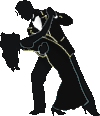
Ballroom Dance
J M (Mike) Nelson
Email:jmnelson@cloudnet.com
Phone: 612-810-0157

| jmnelson.com | Dance Home Page | Dance Curriculum | Dance Articles |
 |
Ballroom DanceJ M (Mike) Nelson |
 |
Reflections on Teaching Recently I admitted that I was a teacher, my teaching field was misunderstood, and clarification precipitated a combination of admiration and skepticism that reminded me that teachers are an interesting group within our species. All who claim to be teachers might not be, and some who do not claim to be might be. The aforementioned admiration came from my initial response when asked what I had taught, and the skepticism began to emerge when the list continued, for I have had a rather varied career, and the list was quite long. Only the insistence of the questioner compelled me to delineate the whole, which covers subjects ranging from the hard sciences to the arts and from the elementary school to graduate school. I've had a wonderful, and wonderfully diverse teaching career. While an undergraduate, one of my educational psychology professors suggested to us that we should be able teach any subject in the public schools, and perhaps a few at the university level, for we knew the subject matter from experience, and we knew the pedagogy for organizing the material from our study of educational psychology. The educational psychology aspect of teaching was further reinforced when I chose a career in instructional design and ended up not only teaching a wide range of subjects but helping design instructional programs in almost every discipline on the university campus. I began to think I could teach anything, and, indeed, perhaps I can, at least to some extent. Teachers certainly don't know everything, and likely don't know as much as many believe, but they can teach almost anything because they know how to teach. Several years ago a friend of mine convinced me to take a consulting job with his company, the largest of its kind in the world and in the process of technological and management reorganization and decentralization. His job was directing the development of instructional packages for retraining almost every employee at every level. His company had to "get it right;" failure was not an option. They created an instructional design team headed by a group of professionals, most with PhDs in some aspect of systematic instructional design. His problem was that the instructional designers were being held to deadlines that depended on the expertise of technical personnel who had no commitment to the training program. My job was to lead the oversight committee, which included people from upper management, to the understanding that all personnel involved must be committed to the timelines, otherwise the development team could not meet its deadlines. Thus the timeline must be a performance criteria for for all concerned, not just the instructional designers. When I asked him, "why pick on me?" His response: because you can dance! You can stand in front of the team, field any imaginable inquiry, and stay focused on the objective. If you can't dance here, you don't have a chance. The smartest people in their field in the world will be seated around the table, and they all rather do something other than participate in this process. I need someone from the outside who can dance around all the attempts at deflection and not be intimidated by anyone. I think you can do it if for no other reason than you won't take it personally and you will let them know that the result won't make any difference to you, but perhaps should make a difference to them." Such flattery! Foolishly I did it, sweat a lot, "danced" quite a bit, but in general was successful. He was grateful, and I found another profession to avoid. Though the process was enlightening, exciting, and lucrative, I gladly returned to the classroom and to my instructional development responsibilities. Retired, tragically single, and a bit lost, I found old friends and made new ones within the ballroom dance community, where people come to dance rather than "troll," where they might be amenable to meeting someone, but where that was not the focus of their gathering. Unfortunately, the old ballroom dance community was over an hour from my home, and I wanted to dance more often than the occasional weekend. Serendipitously I was approached about teaching ballroom dance at a local studio, something I had always admired but never considered attempting. I had collaborated with the ballroom dance teacher at the university in the development of an introductory course in ballroom dance. Reflecting on that experience, my career in general, my educational psychology professor's comments, my "dance" with the corporate big shots, and my freedom to do anything I wanted, I decided to give it a try. It proved successful beyond my imagination. My students could not only dance, they could dance well beyond the normal "graduate" of a six week ballroom dance class. No, this is not to be boastful. It is to point out that some of us are teachers, and some of us are not. Some things we can teach, and some things we cannot. However, if we are, indeed, a teacher, then whatever we know, we can likely demonstrate its whole and structure its parts in a hierarchy of small pieces that can be grasped sequentially by most anyone with sufficient mental abilities, psychomotor capacity, and requisite knowledge. The tragedy regarding teaching is that, in our highly sophisticated world, we still presume that those who know the most and perform the best will be the best teacher. This exists at every level and often at official levels. Whatever needs to be taught, find someone who can do it best and let them teach it. A better solution would be to find someone who can teach, and give them the task of working with the expert to design an instructional program. Therein lies the heart of the failure, or marginal success, of a plethora of teaching institutions. Public school teachers can teach, but they don't always know their subjects, so their students do not always learn as well as they could. Technical schools have teachers who know the subject functionally, but do not know how to teach, so their students struggle. University professors know their specialty, but they don't usually know how to teach it, so the student often has to learn how to learn on their own. Teachers of popular recreational activities are more likely performers than teachers, and community education programs are full of courses taught by subject experts who have little knowledge of pedagogy. Indeed, many scoff at the suggestion that there is more to teaching than subject knowledge and performance ability; yet almost to the person we have experienced the difference between a teacher who, though far from being a genius, was a wonderful teachers in contrast to the virtual genius who could do little more than intimidate. We ignore the fact that the highest paid performers in every sport and art have a teacher who is likely underpaid and certainly paid less. Curious how so few of us put these factors together in any rational manner and realize that teaching requires either two specialists or an exceptional, multitalented individual. Thus we consistently look elsewhere to improve our educational systems when all we need are teachers who know and teach, or a team consisting of both those who know and those who teach. Incongruous that we think ourselves an intelligent species. |
| jmnelson.com | Dance Home Page | Dance Curriculum | Dance Articles |
Copyright (c) 2006, J. M. Nelson. All rights reserved. Reproduction of contents prohibited without prior permission from the author.